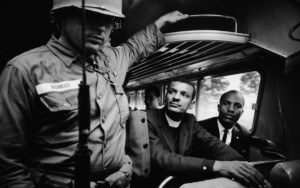How the Harlem Renaissance Sparked a New African American Identity
Photo: Singer and dancer Josephine Baker (1906-1975), a fixture of Harlem Renaissance nightclubs, on a tiger rug around 1925. (Hulton Archive/Getty images)
(history.howstuffworks.com) From poetry and prose to music, painting, sculpture and more, the cultural movement known as the Harlem Renaissance produced an unprecedented array of art and social change among the United States’ newly liberated black population. The end of the Civil War in 1865 ushered in the emancipation of hundreds of thousands of African Americans who had been enslaved, and by 1920, about 300,000 African Americans from the South had moved north in search of economic, social and political freedoms they’d been denied; Harlem, a 3-square-mile (777-hectare) neighborhood in New York’s northern Manhattan, became a destination for around 175,000 African Americans seeking a fresh start.
New York wasn’t the only destination for African Americans from the South, but it was an important one.
“Maybe the most important piece is the demographic factor,” says William J. Maxwell, professor of English and African and African American Studies at Washington University in St. Louis. “There was a mass relocation of black Americans from the South to the North, known as the Great Migration. Particularly after World War I, Northern cities were becoming discernibly blacker. Harlem became the symbolic capital for this, but black people were also moving to cities like Chicago, St. Louis, Cleveland and others.” (more)
‘A dream come true’: African American studies course gets final approval to be offered across Texas
High schools across the state can now begin offering the course pioneered by Dallas ISD as soon as next fall.

In this file photo, buses are lined up in the parking lot of Woodrow Wilson High School in Dallas. The African American studies course approved by the State Board of Education on Friday is based on a course taught in Dallas ISD for the first time this academic year. (Mona Reeder / Staff Photographer)
(dallasnews.com) The State Board of Education has given final approval to an elective African American studies course, opening the door for high schools across the state to begin offering it as soon as next fall.
In a unanimous vote via teleconference, the board approved the course standards on Friday, making it Texas’ second statewide ethnic studies course. The first, focusing on Mexican American studies, gained statewide approval in 2018 after four years of controversy over its creation, textbook material and naming.
But the African American studies course has garnered widespread support from the board and the public since it was proposed last fall.
“April 17th is going to be a historic day,” board member Ruben Cortez of Brownsville said before the final vote. “We as a board have come a long way.”
The course is modeled after a course taught in Dallas ISD for the first time this academic year. Aicha Davis, a freshman board member representing Dallas, asked the board to make the course a statewide option last September. (more)
Related: Harker Heights man helps establish first African American studies program for Texas schools
Follow the Freedom Riders’ Journey Against Segregation During the Civil Rights Era
The Civil Rights activists faced violence in multiple cities in their fight for equality.
(history.com) HISTORY is proud to join with Google Earth to present an interactive view of the Freedom Rides. On the first day of May, in 1961, a group of 13 activists gathered to prepare for one of the most harrowing and courageous challenges to segregation in America. Travel along the bus route the Freedom Riders took and learn about the non-violent strategies they used to achieve racial justice for travelers in the Jim Crow South.
On the first day of May, in 1961, a group of 13 activists gathered to prepare for the Freedom Rides, one of the most harrowing and courageous challenges to segregation in America.
The group was led by Marshall, Texas native James Farmer, director of the Congress of Racial Equality (CORE).(more)
TIPHC Bookshelf
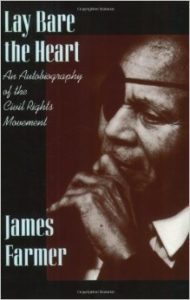 Published scholarship on black history in Texas is growing and we’d like to share with you some suggested readings, both current and past, from some of the preeminent history scholars in Texas and beyond. We invite you to take a look at our bookshelf page – including a featured selection – and check back as the list grows. A different selection will be featured each week. We welcome suggestions and reviews. This week, we offer, “Lay Bare the Heart, An Autobiography of the Civil Rights Movement,” by James Farmer.
Published scholarship on black history in Texas is growing and we’d like to share with you some suggested readings, both current and past, from some of the preeminent history scholars in Texas and beyond. We invite you to take a look at our bookshelf page – including a featured selection – and check back as the list grows. A different selection will be featured each week. We welcome suggestions and reviews. This week, we offer, “Lay Bare the Heart, An Autobiography of the Civil Rights Movement,” by James Farmer.
Texas native James Farmer is one of the “Big Four” of the turbulent 1960s civil rights movement, along with Martin Luther King Jr., Roy Wilkins, and Whitney Young. Farmer might be called the forgotten man of the movement, overshadowed by Martin Luther King Jr., who was deeply influenced by Farmer’s interpretation of Gandhi’s concept of nonviolent protest.
Born in Marshall, Texas, in 1920, the son of a preacher, Farmer grew up with segregated movie theaters and “White Only” drinking fountains. This background impelled him to found the Congress of Racial Equality in 1942. That same year he mobilized the first sit-in in an all-white restaurant near the University of Chicago. Under Farmer’s direction, CORE set the pattern for the civil rights movement by peaceful protests which eventually led to the dramatic “Freedom Rides” of the 1960s.
In Lay Bare the Heart Farmer tells the story of the heroic civil rights struggle of the 1950s and 1960s. This moving and unsparing personal account captures both the inspiring strengths and human weaknesses of a movement beset by rivalries, conflicts and betrayals. Farmer recalls meetings with Franklin and Eleanor Roosevelt, Jack and Bobby Kennedy, Adlai Stevenson (for whom he had great respect), and Lyndon Johnson (who, according to Farmer, used Adam Clayton Powell Jr., to thwart a major phase of the movement).
James Farmer has courageously worked for dignity for all people in the United States. In this book, he tells his story with forthright honesty.
First published in 1985 by Arbor House, this edition contains a new foreword by Don Carleton, director of the Dolph Briscoe Center for American History at the University of Texas at Austin, and a new preface.
This Week in Texas Black History
Apr. 21
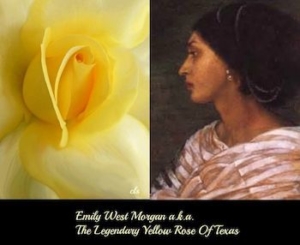
This date marks the commemoration of the song The Yellow Rose of Texas. The song grew out of the Battle of San Jacinto when Texas forces led by Sam Houston defeated the Mexican troops of Gen. Santa Anna in 1836 and won Texas’ independence from Mexico. The song is a tribute to a woman (Emily West) who supposedly “entertained” the Mexican general, delaying his preparations for the battle, while the Texans successfully attacked and defeated his army in an 18-minute skirmish. However, the woman’s true identity and actual role, if any, in the battle is the subject of great debate. Generally, she is thought to have been a light-skinned mulatto, but other theories say she was Hispanic. The songs’ composer is also a mystery, though its original lyrics seem to suggest a black man:
There’s a yellow rose in Texas
That I am going to see
No other darky (sic) knows her
No one only me
She cryed (sic) so when I left her
It like to broke my heart
And if I ever find her
We nevermore will part.
Apr. 23
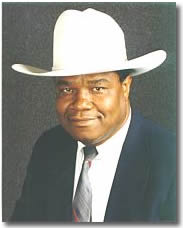
On this date in 2004, Earl Pearson, then a 28-year veteran of the Texas Department of Public Safety, was named chief of the Texas Ranger Division. With his promotion, Pearson became the first black Senior Ranger Captain and the first black DPS division chief. Pearson grew up in Rotan, southeast of Lubbock. Pearson had served as assistant chief of the Rangers since 2001 and was captain of Houston-based Company A for five years. Pearson attended McMurry University in Abilene where he was a starting football player. While at McMurry, a friend encouraged him to join the Texas Department of Public Safety, which he did, graduating from the Recruit Academy in 1976. He then spent 13 years as a trooper with the Texas Highway Patrol. In 1989, he joined the ranks of the Texas Rangers. Pearson rose to Lieutenant in 1992, Captain in 1996 and Assistant Chief in 1991. Pearson retired from public service in 2005 to start his own security services company.
Apr. 23
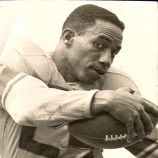
On this day in 1928, black college football great Odie Posey was born in Austin. Posey, a running back, graduated from Phillis Wheatley High School in San Antonio and then attended Southern University in Baton Rouge, La. on a tennis scholarship. Posey teamed with Harold Jones in 1947 to capture the Prairie View Interscholastic League 2A Boys’ Double state championship title. At Southern, Posey became the best running back in school history. His 1,399-yards rushing total in 1949 led the nation (NCAA Division II) and still stands as the highest single-season mark in school history. During his four years at Southern, the Jaguars were 46-2-2 (undefeated, 12-0, in 1948), won three Black College National Championships, four Southwestern Athletic Conference titles and two bowl games, including the 1948 Fruit Bowl Championship against San Francisco State University. Posey was a four-time Pittsburgh Courier All-American and a four-year All-SWAC selection.
Apr. 24

On this date in 1944, The United Negro College Fund was incorporated with 27 member schools (now 38). Mary Branch, president of Tillotson College in Austin, helps to establish the organization. The UNCF’s mission is to enhance the quality of education by raising operating funds for their member colleges and universities, providing financial support to deserving students, and increasing access to technology for students and faculty at Historically Black Colleges and Universities (HBCUs). Both The Non-Profit Times and The Chronicle of Philanthropy have ranked UNCF among the top 10 charitable educational organizations in the country.
Apr. 25
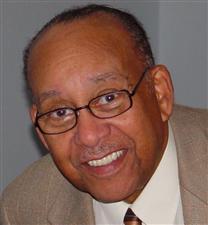
Robert Leon Wormley, who opened the first black-owned insurance agency (Wormley-Mitchell & Associates) in Austin in 1954, died on this day at age 82 in 2010. A Minneapolis, Minn. native, Wormley was a Civil Rights activist who helped picket businesses that practiced segregation and worked to improve life for Austin’s black community. He worked on poverty issues for Govs. Preston Smith and John Connelly. Wormley was the first black member of the Independent Insurance Agents of Austin.
Blog: Ron Goodwin, Ph.D., author, PVAMU history professor
Ron Goodwin is an assistant professor of history at Prairie View A&M University. Even though he was a military “brat,” he still considers San Antonio home. Like his father and brother, Ron joined the U.S. Air Force and while enlisted received his undergraduate degree from Texas Lutheran University in Seguin, Texas. After his honorable discharge, he completed graduate degrees from Texas Southern University. Goodwin’s book, Blacks in Houston, is a pictorial history of Houston’s black community. His most recent book, Remembering the Days of Sorrow, examines the institution of slavery in Texas from the perspective of the New Deal’s Slave Narratives.
Recent Posts
WWJD
Several years ago, these letters, “WWJD?” seemed to be everywhere. We all know they represent “What Would Jesus Do?” I think these letters and the question were meant to challenge society to consider the moral implications of their everyday decisions. Now in this new COVID-19 reality, WWJD may have new meaning. Since my father…(more)
For every beginning there’s an end
To live is to die. Every beginning has an end. That’s not a very pleasant way to begin, but as Believers we are on a journey that ends with the grave. As a child I watched my mother deal with her mother as she entered the last chapters of her life. I didn’t fully understand what was going on, but I remember my mother assisting my grandmother to her various appointments. As life would…(more)
Submissions wanted
Historians, scholars, students, lend us your…writings. Help us produce the most comprehensive documentation ever undertaken for the African American experience in Texas. We encourage you to contribute items about people, places, events, issues, politics/legislation, sports, entertainment, religion, etc., as general entries or essays. Our documentation is wide-ranging and diverse, and you may research and write about the subject of your interest or, to start, please consult our list of suggested biographical entries and see submission guidelines. However, all topics must be approved by TIPHC editors before beginning your research/writing.
We welcome your questions or comments. Please contact Michael Hurd, Director of TIPHC, at mdhurd@pvamu.edu.

